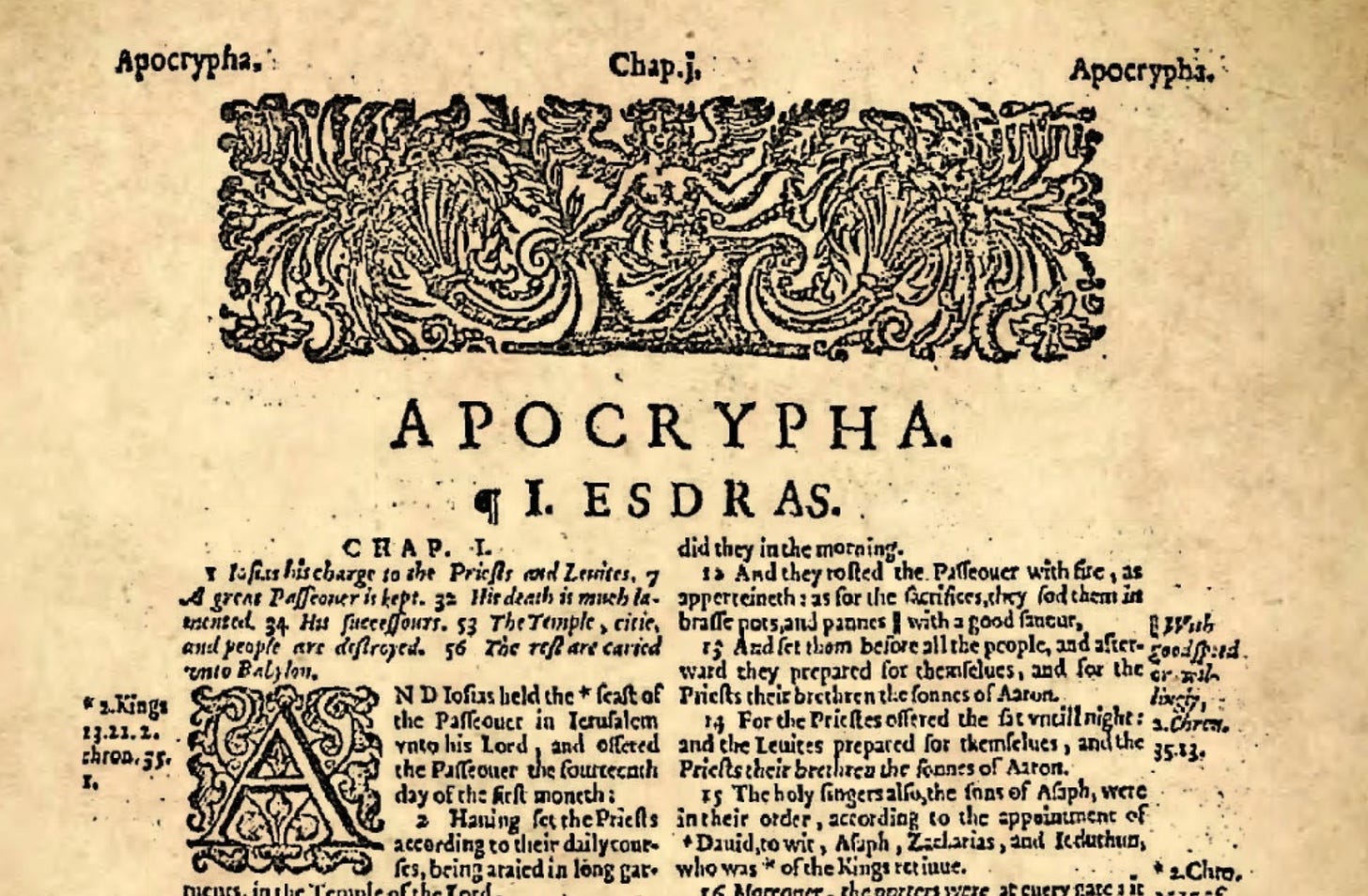Farewell, Joel! Looking Back at the "Bad" Books
Ending one chapter, beginning another—Joel signs off, and Jamey carries the torch
After four years and many legendary conversations, Joel Miller bids farewell to “Bad” Books of the Bible. We reflect on our journey through biblical oddities, favorite moments, and what’s next for Joel.
Joel will be back for the next two episodes—next week we interview Fr. Stephen de Young.
Don’t miss this heartfelt sendoff and a glimpse into the podcast’s future!
My Co-Host’s Last Chapter
It feels strange to write this. For what has been a significant and joyous part of my life, the rhythm has been simple: read a “bad” book of the Bible, do some extra legwork on the scholarship around said book, then hop on a call with my friend Joel Miller, and talk. We called the show “Bad” Books of the Bible, a tongue-in-cheek title for a project born out of a shared, sincere conviction: that these oft-neglected texts are not only “good” but are, in fact, essential for a deeper understanding of the faith.
Now, that rhythm is changing. Joel is stepping back from the co-host chair. It’s not a dramatic exit, but a practical one, born from the happy chaos of a life filled with five kids, a loving wife, and a demanding career. As he put it, he simply needs more time than he has. While he promises to “crash the show again” in the future—and I’ll hold him to that—this moment marks the end of our foundational partnership.
But don’t worry—to mark the transition, we sat down for three more shows! But this one is sort of an exit interview, a chance to look back on the project he envisioned and to capture his final thoughts before handing me the reins.
The episode is available from Ancient Faith, and most podcasting platforms, including Spotify:
Or, listen right here on Substack:
Scripture or Apocrypha?
When Joel first pitched me the idea for this podcast, it was framed as a kind of “reclamation project.” Both of us were raised in evangelical traditions that, for the most part, treated the Apocrypha as a historical curiosity at best, or a dangerous collection of “uninspired” texts at worst. But Joel’s journey, like that of many others, led him to a startling realization—you just don’t know what you don’t know. For both of us, it was like we started scratching the surface of church history and realized that, oh, there’s this whole other collection of books that some Christians—and in fact, most Christians—throughout history—have regarded as Scripture.
This discovery wasn’t just academic, it was formative for Joel. He found that these books weren’t merely historical artifacts but were written as spiritual survival guides. They were, in his words, “basic instruction while you’re stuck out there in the world.” Each book, in its own way, tackles the central question: “How are you a faithful Jew in the midst of a pagan culture?” For modern Christians navigating an increasingly secular world, the parallels are impossible to miss. “These books speak to that,” he affirmed. “They are formative.”
Favorite Bad Books
Looking back on our episodes, we reminisced about the high points. For Joel, the book of Tobit stood out for its sheer narrative charm and its profoundly earthy spirituality. But it was the historical books, particularly 1 Maccabees, that he saw as a key to unlocking the entire world of the New Testament. This period between the Old and New Testaments is a sort of “black box” for many Protestants. After reading 1 Maccabees, it’s like a light goes on and suddenly you have a key to decode what’s happening in the background of the New Testament. Without it, you don’t quite understand the cultural and political tensions—the strife between the Sadducees and Pharisees, the hatred for Roman rule, the longing for a messianic king—that form the very air Jesus and the Apostles breathed.
But if there was one book he championed above all, it was the Wisdom of Solomon—or as he put it with palpable enthusiasm:
I mean, frankly, it’s a New Testament book. It’s not an Old Testament book. Read it. It’s very Old Testament. I mean, it goes through the plagues and everything that you think about in terms of the Old Testament, it’s named after an Old Testament king—but it’s a New Testament book with a New Testament sensibility. And it’s no wonder that Christians read that book, preserved that book. I mean, St. Paul plays with themes from that book. He’s clearly familiar with it because there’s echoes of it in the book of Romans and elsewhere. It’s a thoroughly New Testament book. And the fact that Christians feel reluctant to read it because their tradition says you should be wary of these “Catholic” books. I get, but man, you’re missing out because it’s a killer book. It’s an amazing book.
Canons, Appendices, and Other Scriptural Oddities
We had a clarifying point in the conversation when we brought up the wide proliferation of study Bibles among Christians. These Bibles are published with various features and notes, including explanatory marginal annotations, introductory material, appendices, and so forth. “No one thinks twice about that,” he pointed out. “None of us read those articles and think that they’re holy writ. We know that this is a commentary on holy writ and we’re fine with that. So why are we confused with the other?”
These books are not an attempt to secretly add to the canon, but are rather from the original Christian canon. They are an inspired, ancient commentary that enhances and expands our understanding of the rest of Scripture. They provide the connective tissue, the historical context, and the theological development that makes the whole story of salvation richer and more vibrant.
This led him to a critique of our modern anxieties about canonicity. We worry intensely about which books “belong,” yet we uncritically marinate in a constant stream of digital commentary. “The average person when they’re doing Bible study is moving… back and forth between online sources, articles, Twitter, and a million other inputs,” he observed. “All of which create like an interpretive dome under which you sit… and we don’t think about that enough.” His challenge was pointed: if we could be as critical about our daily media consumption as we are about a collection of 2,000-year-old books, we’d be “far better off.”
Every Man a Scholar?
He also took a moment to gently push back on the modern idea that spiritual maturity is measured by the frequency of personal Bible study. This expectation, he argued, is a “highly historically prejudiced way of thinking about it,” born from the relatively recent accessibility of printed books. For the vast majority of Jewish and Christian history, faith was nurtured by hearing Scripture read in a communal, liturgical setting.
“The idea that every Christian somehow has to be a biblical scholar… is kind of laughable,” he said, “and honestly rude to the legacy of 1500 years of Christians and at least five or six or 700 years of Jewish believers before that who never had their hands on anything like a Bible and yet lived the faith faithfully day in and day out.”
“The scripture is an immense treasure. To spend time in it, to love it, to share it with people is a gift… If you want to see a book spread, if you want to see people take interest in things, we have to share our interest in it.”
Joel J. Miller
Retractions or Regrets?
Of course, no journey of discovery is without a few course corrections—I asked Joel if he had any “retractions,” and he offered two of them.
First, he admitted that our discussions on 1 Maccabees would have been different had we benefited earlier from the insights of our upcoming guest, Fr. Stephen DeYoung. “I wish I had… the benefit of that perspective to just qualify my reading along the way,” he confessed.
Second, he pulled back on an earlier assertion that Tobit was engaged in a sharp polemic against Greek medicine. It was, he mused, perhaps an “over-riff,” a case of reading too much into a textual detail that could have been a “happy accident.”
As for what he wishes we’d gotten to, his answer was simple: “Man, I just wish we’d done more books.” He spoke with excitement about the story of Susanna, a gripping courtroom drama where a young Daniel acts as a Perry Mason-style defense counsel. He lamented not covering the Additions to Esther, which add an explicitly theological layer to the original text. For Joel, these stories are not just theologically significant; they are also a joy to read. “That’s one of the great things about these books,” he said with a smile. “They’re actually really fun,” and can be “just delightful to read.”
What’s Next for Joel?
So what’s next for Joel? He talks about how he has been chipping away at a book about books for nearly a decade—and that book is coming out in November. And he’ll keep sharing his voracious reading habits on his Substack newsletter, Miller’s Book Review. His parting words for our listeners were a simple, heartfelt charge: to become ambassadors for these texts.
“The scripture is an immense treasure,” he said. “To spend time in it, to love it, to share it with people is a gift… If you want to see a book spread, if you want to see people take interest in things, we have to share our interest in it.”
I’ve known Joel Miller for the better part of twenty-five years. Our friendship was forged long before this podcast, and it will continue long after. He is one of the most well-read, intellectually curious, and spiritually grounded people I know. Building this podcast together has been one of the most rewarding creative collaborations I’ve had. The foundation Joel helped lay will always be core to what this show is, and while I’ll be steering things from here, his influence will never be far away.
Questions Asked During the Interview
What was it that first got you interested in these books and what made you want to start a podcast about them?
I know you were raised in an evangelical tradition. When did you first encounter these books and realize there was a larger canon?
You mentioned the books were formative. What do you mean by that?
Looking back on the episodes we’ve done, do you have any favorites that stand out?
You mentioned the importance of the Maccabean-era books. Could you expand on why they are so crucial for understanding the New Testament?
Are there any scholars or guests you wish we could have had on the show?
What is a question or a topic that you wish we’d gotten to, or something that you wish we’d explored more deeply?
Do you have any “retractions,” or things you’ve changed your mind about since we started?
As I continue on with the podcast, do you have any advice for me?
What’s next for you outside of your professional life after the podcast, and will this show influence your future projects?
Do you have any farewell words for the listeners of the podcast?
Prefer to listen or share from YouTube? Check it out here and subscribe:
You can support Simply Orthodox with Logos Bible Software!
Dive deeper into Scripture with Logos Bible Software, the ultimate digital tool for Bible study.
Access thousands of resources—from translations and commentaries to ancient texts like the so-called Apocrypha—to enrich your understanding of the “‘bad’ books” and beyond.
By using our link, you directly support this ministry. Plus, try Logos free for 90 days at logos.com/badbooks!






Thank you
The Kingdom is Vast and we never pray alone!